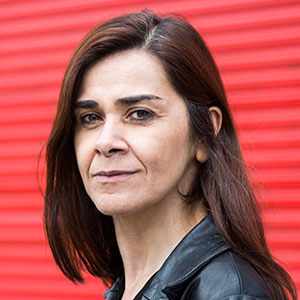

When a punk rock lesbian sound engineer from Iran told me her life story in a Paris fertility clinic, I no longer felt disoriented. A sense of grounding, part Eastern, part Western, brought me home as I learned more about her.
Kimiâ Sadr escaped Iran at the onset of the revolution in 1979, traveling with her mother and sisters through perilous situations in Turkey before eventually making her way to France. Now she was sitting in a waiting room with a tube of sperm, thanks to her donor, some dude named Pierre. Engrossed by her multiethnic, multigendered, multilingual, mythic story, I learned about various generations of her family back in Iranher political dissident father, various uncles, and a strange maternal grandmother who could predict the future by reading coffee groundsall of whom wanted her to be a man, not a woman. Like many fellow travelers, she brought her past along with her. She had stories to tell.
“To really integrate into a culture,” Sadr said, “I can tell you that you have to disintegrate first, at least partially, from your own. You have to separate, detach, disassociate. No one who demands that immigrants make ‘an effort at integration’ would dare look them in the face and ask them to start by making the necessary ‘effort at disintegration.’ They’re asking people to stand atop the mountain without climbing up it first.” Then she dropped references to The Cure’s 1989 LP, Disintegration.
I should clarify that Sadr is the protagonist of a new novel by France’s Négar Djavadi, who, like Sadr, was born in Iran to an intellectual family opposed to the regimes of both the shah and the mullahs. The book unfolds with Kimiâ in the in vitro fertilization clinic waiting room, spilling multiple generations of her family history to the reader. The one-word title, Disoriental, imparts multiple layers of meaning and plays on words. On one hand, it combines disoriented with oriental, calling attention to Western slobs that still use the word ‘Oriental’ to otherize anyone with roots in various parts of Asia. But it also refers to Kimiâ’s disorientation with being assigned female plumbing, yet identifying with the boys instead, then adapting to a new exiled life in France. She evolves into a rebellious female Scheherazade on the margins of society while aspiring to operate soundboards at ’80s post-punk shows and trying to deal with cultural, musical and sexual disorientation.
The title alone reminded me of my half-South-Asian, half-Anglo-San Jose roots in this town, enough to further ridicule how categories of ethnicity, geography and nationality are often confused, leaving everyone disoriented. My dad voluntarily emigrated from India to California as a teenager in the ’50s, yet my mom is a white San Jose native with British ancestry. When anyone asks, I say I’m half-native, half-exotic, since my dad was considered an exotic intruder when he came to San Josethen a backwater fruit-packing cannery town. He was a colorful troublemaker who, right or wrong, loved to lambast the more fossilized purist types. This became one of the lenses through which I often view things, and I’ve written dozens of columns riffing on the collision of native and exotic on multiple levels.
Now, thanks to Négar Djavadi, I have a new identity. From here on out, I will call myself dis-Anglo-riental. That should successfully confuse everyone from Alviso to Gilroy.
But back to the book. Aside from depicting non-heteronormative issues in Iran, where being gay was illegal, and some gritty postpunk scenes from the underside of Europe, Disoriental reveals, through Kimiâ’s family history, an alternative version of 20th century Iran not always articulated by the mainstream Western media. We learn that movements of secular intellectual dissidents on the left were equally as opposed to the Western-subsidized shah as were the more conservative supporters of Khomeini. It wasn’t just an “Islamic Revolution,” as it was initially branded.



